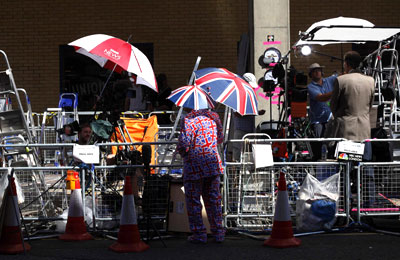
A royal supporter stands outside the media pen
opposite the Lindo Wing of St Mary's Hospital
Britain's royal baby: a world obsession or media hype?
London, July 20, 2013
By Michael Holden
As the world's media whips itself into a frenzy over Prince William and his wife Kate's baby, some bemused spectators are wondering if Britain's royal family really is that fascinating or just hype.
From breathless reports about the baby's due date to endless speculation about the name and manner of delivery, TV crews from around the world have been delivering almost hourly updates outside the London hospital where Kate is due to give birth.
But do audiences really share their enthusiasm about the birth of a child who will be third in line to the British throne, or are they, like Queen Elizabeth's cousin Margaret Rhodes, struggling to see what all the fuss is about.
"You know everybody has babies, and it's lovely, but I don't get wildly excited about it," Rhodes, 88, told CNN.
Recent opinion polls suggest she is not the only one who has not been transfixed by the daily press barrage or glued to some British newspapers' live web shots of the as-yet unbreached entrance to St Mary's Hospital in west London.
According to the Pew Research Center, only 25 percent of Americans surveyed last December when Kate's pregnancy was announced were very or fairly closely following the news.
Previous studies of interest in eight British royal stories dating back to 1986 - including William and Kate's sumptuous wedding in April 2011 - found 60 percent did not follow or were not closely following these events.
There was one exception. The 1997 death of William's mother Princess Diana in a car crash in Paris grabbed the attention of 85 percent of U.S. respondents.
BRITISH CYNICISM
Even in Britain a YouGov poll this week found only 46 percent were very or fairly interested in the birth, which was less than in India, where 57 percent of those surveyed expressed an interest in the arrival of the new royal.
"In Britain there seems to be more cynicism to the royal family, whereas abroad, particularly in America, there is a more romantic imagining of what royal life is like," said Arianne Chernock, an expert on the history of monarchy at Boston University.
"It helps having a few very charismatic figures, but it has to do with the legacy of Britain and the power it had in the world in the 18th and 19th centuries."
Wei Zhang from Hong Kong Phoenix TV, camped outside St Mary's hospital, said there was huge interest in Hong Kong, a British colony until 1997, and in mainland China.
People back home, he told Reuters, wanted to see pictures and videos of "the royal family, everything about the royal family. The princes, the queen, everything".
Chernock said the media fuelled the fascination.
"We are seeing an amplification because of social media, the 24/7 news cycle and the fact there are so many media outlets now," she told Reuters.
GENUINE AFFECTION
For citizens in countries such as Canada and Australia, two of the 16 realms of which the baby is destined to be the future king or queen, even those who want to get rid of the monarchy admit there is genuine affection and interest.
"The fact is most Australians have nothing but goodwill for the royal family in Britain," Australian Republican Movement national director David Morris told Reuters. "But that does not mean that we see them as ruling over us."
So why do people still care about the British royals, who wield no real power and whose position is largely ceremonial?
Part of the fascination stems from the triumph of a highly rated public relations team that over the last decade has rebranded a staid institution, aided by the emergence of media-savvy royals such as William and his younger brother Harry.
Interest was also boosted by the travails of the royal family in the 1990s, with the marriage breakdowns of three of the queen's children, most notably that of Prince Charles and Diana, which turned them into a celebrity soap opera.
"Twenty-one years ago, everyone talked about the soap opera of the British royal family in tragic and disastrous terms, and fair enough, it's all come good," royal historian Robert Lacey told Reuters.
"So if it was a soap opera then, all the more so now."
Carolyn Harris, a Canadian historian who specialises in European monarchies, said the constant attention creates a familiarity that in turn fans the appeal.
"Audiences worldwide feel as though they watched William and Harry grow up and mourned with them when Princess Diana died in 1997," she told Reuters.
Author Claudia Joseph, who has penned a biography of Kate, said the huge popularity of Diana and now Kate also helped.
"Everybody's been waiting for a royal princess to step into Diana's footsteps. William is immensely popular around the world because of being Diana's son as well as the way he carries himself," she told Reuters.
"People like a fairytale, and the idea you can come from nowhere and marry a prince." – Reuters







